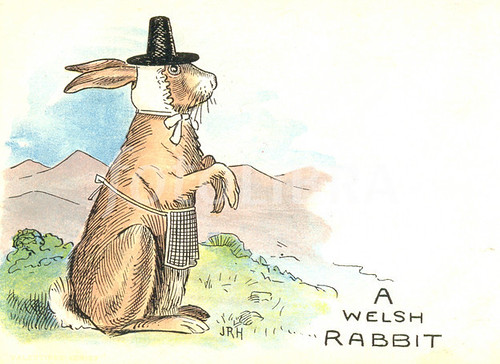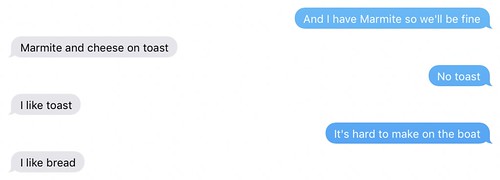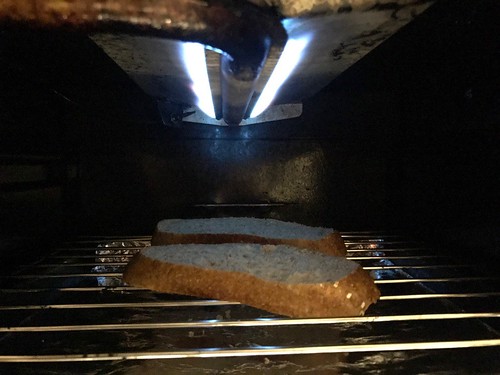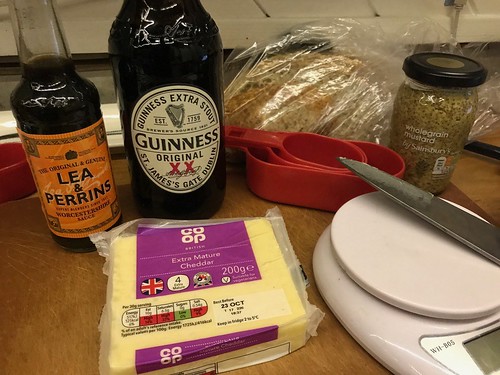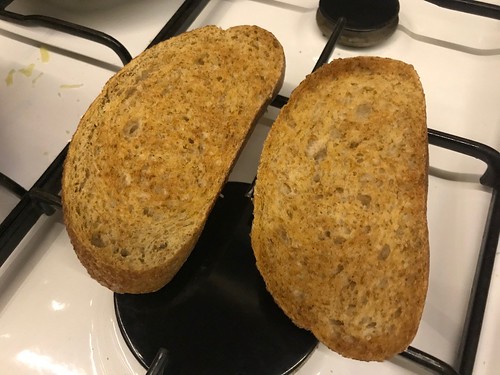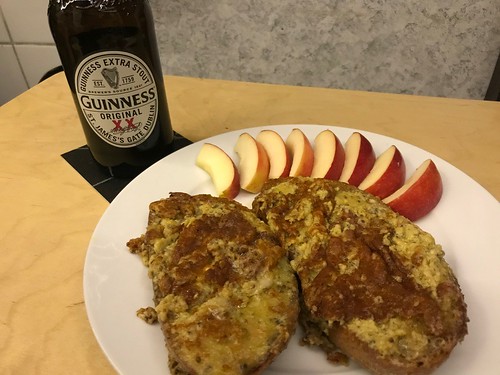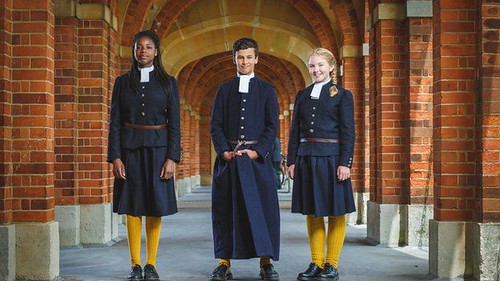It’s been a while since I blogged about any local food (a year ago in fact, with Summer Pudding) and the weather has turned chilly enough that I’ve had to get the fire going some nights, which is lovely and cozy. This, coupled with my now work-free lifestyle made it good time to contemplate a nice hearty toasty yummy treat like Welsh rabbit, which you sometimes see spelled “Welsh rarebit” even though it’s always pronounced “Welsh rabbit”.
Welsh Rabbit is really just posh cheese on toast, and since I’m a big fan of cheese in any form I figured it was about time to test this out. This is despite the fact that toast is not really a boat-friendly foodstuff, because a conventional toaster draws about nine zillion watts of power, which is not healthy for one’s batteries. I do have one of those folding camping toasters to put on the stove, but it’s pretty crap. And it's possible to toast bread in the oven under the grill (broiler) but that’s not very fun, for reasons which will become clear below, which prompted this exchange between me and Karen when I was attempting to get her to tell me what food to stock up on for her recent visit.
Having a gas stove is great for cooking. Having a gas oven is better than having no oven at all, but not brilliant. Having a gas grill/broiler is the worst of the lot. Mine didn’t work for ages because some kind of thermostat thingy was broken when I first bought the boat, but I've had that repaired. Still, it’s a remarkably temperamental bit of kit. I have to light it with a BBQ lighter (though that’s true for the hob and the oven as well) and then verrrrrry gently release the gas knob, or it will go out. And then verrrrrry slowly close the door, or it will go out. And then when you put the food in you have to verrrrrry verrrrrrrrrrrry slowly open the door, or it will go out. And if you have to relight it the odds of it going out again spontaneously, or at any of the above repeated stages increases dramatically. Basically, you need to be a Grill Whisperer to actually achieve toasting, which is kind of ironic because toast is not exactly Cordon Bleu Level cookery. That’s why I have a general reticence about toasting on the boat. However, I also have a general love of things that are toasted, especially cheese, so what the heck, let’s dive in.
It’s not really clear why Welsh rabbit is called rabbit at all, nor why it is spelled sometimes spelled “rarebit” but still pronounced “rabbit”. The first recorded use, in 1725, was “rabbit”, with the “rarebit” option appearing 60 years later. Probably the alternate spelling was devised by killjoys who kept pedantically and cheerlessly pointing out that "there’s no rabbit in the recipe so really it’s misleading to called it rabbit and while we’re at it would you like a nice bowl of mock tertull soup?”
As for the Welsh connection, that’s pretty tenuous too and seems to boil down to something best expressed as, “Gosh those Welsh sure like their toasted cheese don’t they?” Wikipedia claims that "the notion that toasted cheese was a favourite dish irresistible to the Welsh has existed since the Middle Ages” and recounts a joke about St. Peter tricking all the Welshmen in heaven to leave by claiming there was toasted cheese just outside the Pearly Gates. Ho ho! What a merry jape!
The distinctive thing about Welsh rarebit though is that it’s not just a lump of cheese on toast, it’s grated cheese mixed with other yummy stuff on toast and then melted all together.
Let’s start first with the cheese, which should be a strong old variety, cheddar being the most common. The toast should be made from decent real bread that can stand up to toasting and then being smothered in yummy gloop without melting into pappy nothingness. If grilling your toast (instead of taking the easy way out by putting a slice of bread into some sort of electrically powered device that heats it evenly on both sides at once) it’s best channel your inner Grill Whisperer and toast both sides instead of slacking off and only doing one side.
What elevates the Welsh rarebit are the small additions to the grated cheese that loosen up the cheese mixture and add an extra kick of flavour. It seems to be generally agreed that some kind of liquid goes into the mix, with ale or other beer a popular choice. Mustard is also usual and Worcestershire sauce is mandatory.
Worcestershire sauce lives in the same family as other fermented liquid condiments like fish sauce. Originally formulated by the Lea & Perrins company in the 1830s, its makers did not find it particularly beguiling on first tasting, set it aside, and forgot about it. When the barrels were rediscovered months later it had mellowed into the umami-packed flavour festival we know today. The exact recipe of original Lea & Perrins Worcestershire sauce is a secret but a discarded note from the 19th century discovered in a bin in 2009 features vinegar, molasses, sugar, anchovies, tamarind and spices. A little goes a long way. As well as flavouring Welsh rabbit, it’s also used in a lot of beef dishes and, of course, in Bloody Marys and Caesars (which definitely deserve a mention I ever do a home-grown Canadian GRUB post.)
But back to Welsh rabbit. Here’s how I attempted to make it, with thanks to the Guardian recipes section.
Here’s what really happened:
WELSH RAREBIT
2 slices of chunky toast: I actually managed this! Even with the recalcitrant grill.
1 tsp English mustard powder. Local grocery lacks powdered mustard so use a dollop of grainy mustard because I’m pretty sure that one recipe I read online somewhere mentioned grainy mustard.
3 tbsp stout like Guinness. No trouble. Tragically, the recipe uses a very small amount, so need to find another use for the remaining 26.3 tablespoons.
30g butter: Think to self, “This seems like an awful lot of butter for two slices of toast”. Use it anyways, because: Butter!!
Worcestershire sauce, to taste: This ended up being a couple of teaspoons.
175g hard sharp cheese, grated: Again think to self, “This seems like an awful lot of cheese for two slices of toast.” Prepare a bit less, and use up random bits of cheese from the fridge including the end of a bit of parmesan.
2 egg yolks: Start separating eggs having carefully set out a dish for the excess whites, but no dish for the yolks. End up leaving each yolk nestled in half an egg shell perched precariously on the counter leaning against random utensils thinking, “This is going to end badly."
1. Mix the mustard powder with a little stout in the bottom of a small pan to make a paste, then stir in the rest of the stout and add the butter and about 1 tsp Worcestershire sauce – you can always add more later if you like. Heat gently until the butter has melted: Mix everything in the pan and think, “This is awfully wet looking."
2. Tip in the cheese and stir to melt, but do not let the mixture boil. Once smooth, taste for seasoning, then take off the heat and allow to cool until just slightly warm, being careful it doesn't solidify: Add cheese and think, “Yes, I was right, this is awfully wet. This is going to be like ladling soup onto toast. I’ll add the rest of the cheese." Add more cheese.
3. Pre-heat the grill to medium-high, and toast the bread on both sides: Success!
4. Beat the yolks into the warm cheese until smooth, and then spoon on to the toast and cook until bubbling and golden. Serve immediately: Beat the yolks into the warm cheese until still a bit lumpy and very very soupy indeed. Spoon onto toast and think, “Yes, this is exactly like covering toast in a very tasty cheese soup full of raw egg yolk.” Put it under the grill. Open the oven door to check and hear the grill go out. Relight the grill. See the grill go out. Swear. Relight the grill. See the grill go out. Swear a lot. Relight the grill. See the grill go out. Give up on the grill and light the oven. Gently warm the proto-rarebit in the oven. Spoon the rest of the cheese soup on top, because the initial covering has congealed enough to support another layer. Monitor cooking and decide the oven is just not getting the job done. Put both slices of toast, soup-side down, in a frying pan on the stove, thus perhaps inventing something called Australian Rarebit.
So I did eventually end up with warmed cheese on toast, though the process was arduous. If I ever attempt this again I'll probably need to outsource the toasting to save precious working grill time for the actual toasting of the cheese. Or perhaps I could make the toast the day before, to give the grill a chance to recover. (Though considering this is meant to be a simple and easy recipe, the need to prep a day ahead seems not entirely in the spirit.) And I'll use 90% less butter and probably skip the egg yolks or only use one, since I can't really see what they add to the party. It seems to me the irreducible elements of Welsh rarebit are: toast, cheese, mustard, Worcestershire sauce and a working grill. Perhaps those of you with toasters and working grills could do a bit of experimentation and report back. It's about time you lot started earning your keep anyway.
Thus ended my grand experiment in Welsh Rarebit, which I only embarked on because I thought it would be a quick and easy thing to blog about which then devolved into a messy, sweaty, sweary fight to the death with the grill.
Thank God for the Guinness, that's all I have to say.
Note: No rabbits were harmed in the production of the blog post, largely because Welsh rarebit has nothing at all to do with rabbits.
She’s flexible, I’ll give her that!
The grill in one of its rare moments of actually producing heat.
As for the Welsh connection, that’s pretty tenuous too and seems to boil down to something best expressed as, “Gosh those Welsh sure like their toasted cheese don’t they?” Wikipedia claims that "the notion that toasted cheese was a favourite dish irresistible to the Welsh has existed since the Middle Ages” and recounts a joke about St. Peter tricking all the Welshmen in heaven to leave by claiming there was toasted cheese just outside the Pearly Gates. Ho ho! What a merry jape!
The distinctive thing about Welsh rarebit though is that it’s not just a lump of cheese on toast, it’s grated cheese mixed with other yummy stuff on toast and then melted all together.
Let’s start first with the cheese, which should be a strong old variety, cheddar being the most common. The toast should be made from decent real bread that can stand up to toasting and then being smothered in yummy gloop without melting into pappy nothingness. If grilling your toast (instead of taking the easy way out by putting a slice of bread into some sort of electrically powered device that heats it evenly on both sides at once) it’s best channel your inner Grill Whisperer and toast both sides instead of slacking off and only doing one side.
What elevates the Welsh rarebit are the small additions to the grated cheese that loosen up the cheese mixture and add an extra kick of flavour. It seems to be generally agreed that some kind of liquid goes into the mix, with ale or other beer a popular choice. Mustard is also usual and Worcestershire sauce is mandatory.
For the uninitiated, Worcestershire Sauce is in the orange labelled bottle on the left, and presents an even greater linguistic challenge that “rarebit”, being pronounced “WUSS-ter-sher” sauce, and originates in Worcestershire, obviously. Sometimes it’s even shortened to “Wooster Sauce” because the English like nothing better than leaving out whacking great chunks of words when they pronounce them. In the pantheon of typically English behaviours (alongside queueing, moaning and self-depracating humour) utterly ignoring three-quarters of the letters in a word is an area where the English perform effortlessly at an Olympic level.
But back to Welsh rabbit. Here’s how I attempted to make it, with thanks to the Guardian recipes section.
WELSH RAREBIT
2 slices of chunky toast
1 tsp English mustard powder
3 tbsp stout like Guinness (tragically, the recipe uses a very small amount, so you’ll have to find another use for the remaining 26.3 tablespoons)
30g butter
Worcestershire sauce, to taste
175g hard sharp cheese, grated
2 egg yolks
1. Mix the mustard powder with a little stout in the bottom of a small pan to make a paste, then stir in the rest of the stout and add the butter and about 1 tsp Worcestershire sauce – you can always add more later if you like. Heat gently until the butter has melted.
2. Tip in the cheese and stir to melt, but do not let the mixture boil. Once smooth, taste for seasoning, then take off the heat and allow to cool until just slightly warm, being careful it doesn't solidify.
3. Pre-heat the grill to medium-high, and toast the bread on both sides.
4. Beat the yolks into the warm cheese until smooth, and then spoon on to the toast and cook until bubbling and golden. Serve immediately.
Here’s what really happened:
WELSH RAREBIT
2 slices of chunky toast: I actually managed this! Even with the recalcitrant grill.
Photographic evidence of perfect toast, made on the boat.
1 tsp English mustard powder. Local grocery lacks powdered mustard so use a dollop of grainy mustard because I’m pretty sure that one recipe I read online somewhere mentioned grainy mustard.
3 tbsp stout like Guinness. No trouble. Tragically, the recipe uses a very small amount, so need to find another use for the remaining 26.3 tablespoons.
30g butter: Think to self, “This seems like an awful lot of butter for two slices of toast”. Use it anyways, because: Butter!!
Worcestershire sauce, to taste: This ended up being a couple of teaspoons.
175g hard sharp cheese, grated: Again think to self, “This seems like an awful lot of cheese for two slices of toast.” Prepare a bit less, and use up random bits of cheese from the fridge including the end of a bit of parmesan.
2 egg yolks: Start separating eggs having carefully set out a dish for the excess whites, but no dish for the yolks. End up leaving each yolk nestled in half an egg shell perched precariously on the counter leaning against random utensils thinking, “This is going to end badly."
1. Mix the mustard powder with a little stout in the bottom of a small pan to make a paste, then stir in the rest of the stout and add the butter and about 1 tsp Worcestershire sauce – you can always add more later if you like. Heat gently until the butter has melted: Mix everything in the pan and think, “This is awfully wet looking."
2. Tip in the cheese and stir to melt, but do not let the mixture boil. Once smooth, taste for seasoning, then take off the heat and allow to cool until just slightly warm, being careful it doesn't solidify: Add cheese and think, “Yes, I was right, this is awfully wet. This is going to be like ladling soup onto toast. I’ll add the rest of the cheese." Add more cheese.
3. Pre-heat the grill to medium-high, and toast the bread on both sides: Success!
4. Beat the yolks into the warm cheese until smooth, and then spoon on to the toast and cook until bubbling and golden. Serve immediately: Beat the yolks into the warm cheese until still a bit lumpy and very very soupy indeed. Spoon onto toast and think, “Yes, this is exactly like covering toast in a very tasty cheese soup full of raw egg yolk.” Put it under the grill. Open the oven door to check and hear the grill go out. Relight the grill. See the grill go out. Swear. Relight the grill. See the grill go out. Swear a lot. Relight the grill. See the grill go out. Give up on the grill and light the oven. Gently warm the proto-rarebit in the oven. Spoon the rest of the cheese soup on top, because the initial covering has congealed enough to support another layer. Monitor cooking and decide the oven is just not getting the job done. Put both slices of toast, soup-side down, in a frying pan on the stove, thus perhaps inventing something called Australian Rarebit.
You can really see the extravagant butter content start to show itself here.
Sample the remaining 26.3 tablespoons of Guinness and cook until losing the will to continue and turning the whole mess out onto a plate.
Jazz things up with a sliced apple, artfully displayed. Nevermind that the rarebit itself does not look precisely appetising. Remember how much butter and cheese were involved and tuck in.
So I did eventually end up with warmed cheese on toast, though the process was arduous. If I ever attempt this again I'll probably need to outsource the toasting to save precious working grill time for the actual toasting of the cheese. Or perhaps I could make the toast the day before, to give the grill a chance to recover. (Though considering this is meant to be a simple and easy recipe, the need to prep a day ahead seems not entirely in the spirit.) And I'll use 90% less butter and probably skip the egg yolks or only use one, since I can't really see what they add to the party. It seems to me the irreducible elements of Welsh rarebit are: toast, cheese, mustard, Worcestershire sauce and a working grill. Perhaps those of you with toasters and working grills could do a bit of experimentation and report back. It's about time you lot started earning your keep anyway.
Thus ended my grand experiment in Welsh Rarebit, which I only embarked on because I thought it would be a quick and easy thing to blog about which then devolved into a messy, sweaty, sweary fight to the death with the grill.
Thank God for the Guinness, that's all I have to say.

